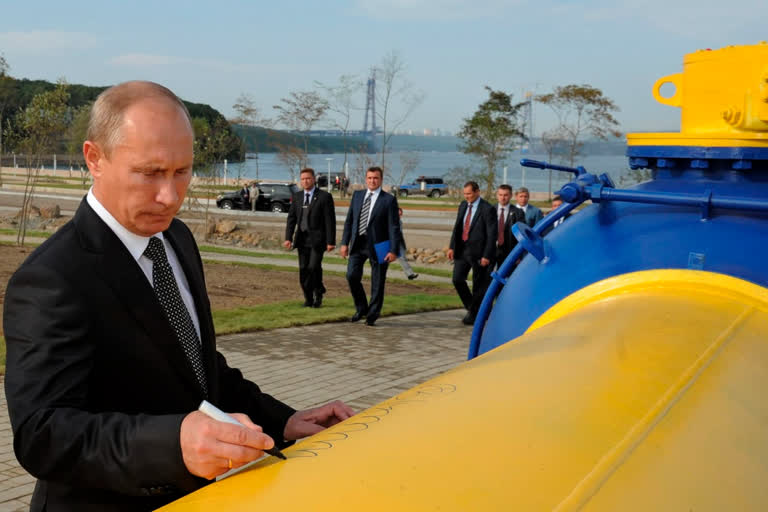New Delhi: Even as the US-led sanctions against Russia are seemingly losing their bite with Russian fossil fuels selling like never before, there is a sense of unease in the US-led camp as divisions are cropping up. When the Russian troops moved into Ukraine on February 24, Russia in that month, ranked 20 among the world’s leading crude exporters. In March, it moved to ninth position, in April, it moved to fifth rank, and in May, Russia became the second largest crude exporter after Iraq.
Fossil Fuel
According to a recent report by the Finland-headquartered Centre for Research on Energy and Clean Air (CREA), Russia earned EUR 93 billion in revenue from fossil fuel exports in the first 100 days of the war (February 24 to June 3) with the EU itself importing 61% worth about 57 billion EUR.
The biggest buyers of Russian fossil fuels—which includes pipeline gas, crude oil, LNG, oil products and coal—were China, Germany, Italy, Netherlands, Turkey, Poland, France and India. Capitalizing on deep discounts on offer, India increased its import of Russian oil by ten-fold with Russian crude now meeting 20% of India’s requirement up from a mere 2% in February.
Also read: Russia overtakes Saudi Arabia to become India's 2nd biggest oil supplier
Space Matters
While it may be a no-holds barred fight between the US-led western block and Russia over Ukraine, it is a different story up there in space where there is close collaboration between the two. On Saturday, Dmitry Rozozin, director-general of the Russian State Space Agency Roscosmos, told Russian media that the US has recently made the payment of $34.4 million in rubles (amounting to 2 billion rubles) for NASA astronaut Mark Vande Hei’s flight on Russia’s Soyuz spacecraft.
Vande Hei and Russian cosmonauts Anton Shkaplerov and Pyotr Dubrov landed back on earth in Kazakhstan on March 30—a full 35 days after the Russian military action in Ukraine. While NASA made the payment through the US firm Axiom Space, but in the process rode roughshod over the stringent US-initiated economic sanctions.
Division in Ranks
Meanwhile, the sanctions have divided NATO with Turkey at odds with the US-led effort while the ‘big three’ of the EU—France, Germany and Italy—have reservations on the US endgame over Ukraine. Not in favour of a protracted conflict, France, Germany and Italy along with several other EU members are in favour of negotiations with the Russians. This is also because they have umbilical ties with Russia as far as their energy requirements are concerned.
Advocating a soft line towards Moscow and again offering to mediate between Russia and Ukraine, French President Emmanuel Macron said in a recent interview to the regional media in Paris: “We must not humiliate Russia so that the day when the fighting stops we can build an exit ramp through diplomatic means.”
Moreover, whatever alternative is being offered to Russian-gas dependent EU economies will take a minimum of two-three years for the infrastructure to be set up. On the other hand, the US and UK have long term plans against the Russians. Even within the EU, there is a sharp distinction in what the Baltic nations want and what the countries of the Balkan region want, with the former being more vehement in their opposition to the Russians.
Capped Price
With no clear consensus among European nations till date on how to deal with Russia on sanctions on gas and oil, there are clear signs that the US-led policy may be faltering. That the US itself is apprehensive is indicated by the recent signaling by US President Joe Biden who said that Russia may be allowed to sell crude priced below a fixed cap as against the blanket sanctions.
Also read: EU leaders agree to ban 90% of Russian oil by year-end
“There’s a whole lot of consideration going on about what can be done to maybe even purchase the oil but at a limited price,” Biden had said. Amid very high inflation levels, a gallon of gas costs $4.67 in the US. With oil, gas scarcity hitting new highs in Europe and US and the fear of shortage of wheat and other food grains looming over Africa due to port blockages, questions are being asked as to whether the US-led sanctions on Russia are serving their purpose.
Russia is among the biggest suppliers of natural gas to Europe while traditionally, Russia and Ukraine together contribute about one-third of the world’s wheat which is largely sold to Africa and Asia. That many European nations continue to buy fuel from Russia overriding the sanctions with a complex banking system providing cover underlines the faulty manner in which the sanctions regime was formulated.


